8 Sep 2017 | Media Freedom, media freedom featured, News and features, Turkey, Turkey Uncensored
[vc_row][vc_column][vc_column_text]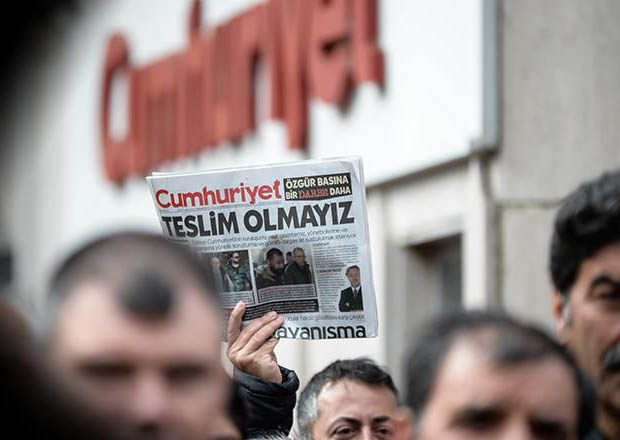
“Of course I am afraid. Only a fool wouldn’t be afraid at such a time,” said Ali Sirmen, a veteran journalist who has spent decades working at Cumhuriyet, whose writers and executives — five of whom remain imprisoned — are on trial facing terror charges.
This is not the first time journalists from Cumhuriyet have faced trial. The newspaper’s long history — it was founded in 1924 and christened by none other than the republic’s founder Mustafa Kemal Atatürk; “cumhuriyet” is the Turkish word for republic — is one of “prisons and clampdowns” according to Cumhuriyet’s own wording. The newspaper has been shut down many times, many of its employees imprisoned and six of them were murdered over the course of its 93-year long history.
The 78-year-old Sirmen first started at Cumhuriyet in 1974 and wrote for the newspaper until 1991, when he walked with 80 other journalists in protest of the editorial line adopted by then editor-in-chief Hasan Cemal. After a seven year stint at the then-mainstream Milliyet, Sirmen returned to Cumhuriyet in 1998.
Sirmen was imprisoned both after the 12 March 1971 and 12 September 1980 military coups for his writing. He has seen both civilian and military prisons. He was eventually acquitted both times, but only after serving time in prison.
“If I had stayed 20 more days in prison in the 12 September period, I would have completed the sentence they were seeking for me,” he remembers. “The practice of pretrial detention as punishment for journalists started in those times,” Sirmen said.
Keeping up appearances
According to Sirmen, trial proceedings of military eras were mostly a show, but they were still less farcical than the courtrooms of post-15 July Turkey. “They [the courts of military rule periods] at least tried to keep up appearances. They abided by established procedures; here, there is no such concern at all.”
“As someone who knows the prisons of the coup periods, I have said many times that the situation is much worse today. For example, when I was acquitted in the Madanoğlu trial [in which Sirmen was accused of supporting a failed coup in 1971] the Military Court of Cassation overruled our convictions twice in spite of pressure from the military regime. Can such a thing happen today?” he asked.
Hasan Cemal, the editor-in-chief whom Sirmen walked out on in 1991, agrees. “Cumhuriyet was shut down during both coup periods; saw immense levels of crackdowns, its writers were imprisoned many times, but not to the extent that we see today.”
Like Sirmen, Cemal agrees that the judiciary tried to act in compliance with the law despite pressure. “There was no rule of law in the 12 September period; true, but to a certain extent, there was a state that heeded laws. We don’t have that anymore.”
A secular, forward-looking newspaper
But Cemal doesn’t believe in comparisons. “It might be misleading comparing one grievance with another. If journalism is considered a crime in our day, if freedom of expression is being trampled under feet, if the media today has only one voice, what good would it do to compare this horrible situation with the 12 March or 12 September period?”
Although the two journalists might have locked horns in the past, both name “belief in democracy, secularism and the rule of law” as the definitive values which Cumhuriyet stands for. Both of them also agree that it is precisely why the newspaper, which is doing poorly both financially and in terms of circulation, has come under attack. Why would anyone bother to silence an apparently moribund newspaper?
“The way Cumhuriyet views secularism, democracy, the supremacy of law, freedoms and human rights; its face is turned towards the west; all of these are unacceptable for the Erdoğan mentality. Because if Cumhuriyet is the west, then Erdoğan is the east,” according to Cemal. [/vc_column_text][vc_separator color=”black”][/vc_column][/vc_row][vc_row][vc_column width=”1/2″][/vc_column][vc_column width=”1/2″][/vc_column][/vc_row][vc_row][vc_column][vc_custom_heading text=”Media freedom is under threat worldwide. Journalists are threatened, jailed and even killed simply for doing their job.” font_container=”tag:h3|text_align:left” use_theme_fonts=”yes” link=”url:https%3A%2F%2Fwww.indexoncensorship.org%2Fcampaigns%2Fpress-regulation%2F|||”][vc_row_inner][vc_column_inner width=”1/2″][vc_column_text]Index on Censorship monitors media freedom in Turkey and 41 other European area nations.
As of 8/9/2017, there were 522 verified violations of press freedom associated with Turkey in the Mapping Media Freedom database.[/vc_column_text][/vc_column_inner][vc_column_inner width=”1/2″][vc_column_text]Index on Censorship campaigns against laws that stifle journalists’ work. We also publish an award-winning magazine featuring work by and about censored journalists. Support our work today.[/vc_column_text][/vc_column_inner][/vc_row_inner][/vc_column][/vc_row][vc_row][vc_column][vc_separator color=”vista_blue”][vc_column_text]A game of thrones
The incident in which dozens of writers left Cumhuriyet en masse in protest of Cemal in 1991 was not the first episode of ideological shifts in the newspaper’s history manifested as a show-down. In fact, the newspaper is notorious for infighting, which, this time, gave the prosecutors material to base the current trial on. In fact, two reporters whose testimonies were included in the indictment still work at the newspaper and they will testify in Monday’s trial.
On 2 April 2013, the Cumhuriyet Foundation — which appoints the editor-in-chief of the newspaper — saw a change of guard: a more liberal group, as opposed to the traditionally hard-line Kemalist executives, was elected to the seats on the foundation’s executive board. Testimony from some of the former board members are also included in the indictment, and these individuals will also testify — most likely against the defendants — in the hearings that begin on 11 September.
The new foundation team, the prosecutor says, hired columnists and allowed reporting that served the purposes of the Fethullah Gülen Network, which is referred to as a terrorist organisation by Turkish courts.
A legal battle over the foundation’s leadership is still ongoing and pro-government media has openly sided with the old guard at Cumhuriyet. That is a separate case, but Cumhuriyet being forcefully returned to its previous executives is not a far-fetched possibility.
A brief history of government pressure on Cumhuriyet
Detentions and arrests
Detention and imprisonment of Cumhuriyet journalists go back a long way. In one of the notable cases in 1962, contributor Şadi Alkılıç and editor Kayhan Sağlamer were arrested and imprisoned over an article published in Cumhuriyet praising socialism. Alkılıç was acquitted in 1967 after a higher court overruled his sentence handed down over socialism propaganda.
İlhan Selçuk, one of the newspaper’s iconic names, who was also the founder of the Cumhuriyet Foundation, and the then editor-in-chief of the newspaper, Oktay Kurtböke, and several other Cumhuriyet writers were detained after the 12 March 1971 coup d’état — along with several others. Selçuk was subject to torture in prison in this period, where he and his fellow defendants were accused of supporting a failed coup attempt that would have taken place three days prior to the actual coup.
Ali Sirmen, Erdal Atabek and Ataol Behramoğlu were imprisoned by the courts of the 1982 military regime for membership of the left-wing Peace Association.
More recently, in 2008, the newspaper’s Ankara Bureau Chief Mustafa Balbay was imprisoned in an investigation into Ergenekon, a behind-the-scenes network which allegedly plotted to overthrow the AKP government, according to the prosecutor. Columnist Erol Manisalı was also arrested in the same investigation in 2009; he was released after three months in prison. İlhan Selçuk was also detained in the same investigation.
In May 2016, the newspaper’s former editor-in-chief Can Dündar and Ankara Bureau Chief Erdem Gül were arrested over a news story which suggested that the Turkish government sent weapons and ammunition to armed jihadist groups in Syria.
Outside the current case, Oğuz Güven, editor of the newspaper’s internet edition, was imprisoned for a month when for a headline cumhuriyet.com.tr used describing the accidental death of a prosecutor who led investigations into the 15 July 2016 failed coup.
Closures:
The newspaper was shut down for the first time on October 29 1934 for 10 days. Then it was shuttered for 90 days in 1940 over its publications that went against the official line of the government. After the 12 March 1971 coup d’état, it was shuttered for 10 days. It was shut down twice following the September 12 1980 coup d’état in Turkey by the military junta, first over an article by İlhan Selçuk, which praised “Kemalizm” and later over a book written by the newspaper’s chief columnist and owner Nadir Nadi.
Assassinations:
Cumhuriyet journalists have also faced fatal attacks. Six Cumhruiyet journalists, all of whom were known for their staunch secularist views, have been killed since 1978. Columnist Server Tanilli, an Istanbul University academic, was left paralysed following an armed attack on 7 April 1978. Cumhuriyet columnist Cavit Orhan Tütengil was assassinated on 7 December 1979 while waiting for a public bus.
The newspaper also took its share of the violence at the height of Turkey’s unsolved murders — which are commonly believed to be state sponsored– in the 1990s. Columnist Muammer Aksoy, who was also the president of the Atatürkist Thought Assassination, was shot dead while he was on his way home in Ankara in 1990. Socialist columnist Bahriye Üçok was killed by a bomb package sent to her house on 6 October 1990. Investigative journalist Uğur Mumcu was killed when a bomb placed in his car detonated on Jan. 24, 1993. Columnist Onat Kutlar died as a result of injuries sustained also in a bomb attack on 30 December 1994. Cumhuriyet’s Ahmet Taner Kışlalı was also killed in front of his house in a bomb attack in 1999.[/vc_column_text][/vc_column][/vc_row][vc_row][vc_column][vc_basic_grid post_type=”post” max_items=”12″ style=”load-more” items_per_page=”4″ element_width=”6″ grid_id=”vc_gid:1504883275252-0c531056-a363-8″ taxonomies=”7790″][/vc_column][/vc_row]
5 Jun 2017 | News and features, Turkey, Turkey Uncensored
[vc_row][vc_column][vc_column_text]
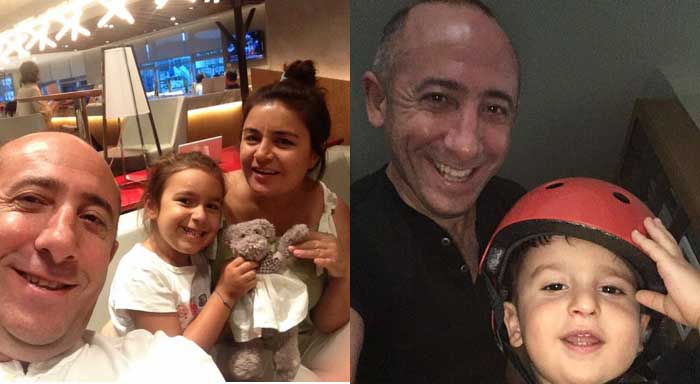
Journalist Murat Aksoy has been detained since his first arrest on 3 September 2016. Above, Aksoy with his wife Şehriban, daughter Zehra Duru and son Ali Emre.
Journalist Murat Aksoy was arrested twice during the government’s investigations into Turkey’s failed coup of 15 July.
On 6 June, prosecutors filed an indictment seeking two life sentences for Aksoy and 12 other defendants.
His first arrest was on 3 September 2016 on suspicion of being involved with the Fethullah Gülen network — an Islamist group allegedly behind the attempted coup, officially called the Fethullahist Terrorist Organisation (FETÖ) by the regime.
A court ordered Aksoy released on 31 March pending trial, but before he even left Silivri Prison he was detained again along with 13 others, this time on charges of “attempting to overthrow the government”.
The charges are baffling, according to his wife of 17 years, Şehriban Aksoy. “When the headscarf was banned, he always wrote articles against the ban. We are speaking of a man who stated at every opportunity that the state doesn’t have the right to interfere in anyone’s outfit.”
Except for a brief period at the Millet newspaper, Aksoy did not work at any news organisations believed to be affiliated with the Gülen group — something that is now considered a crime. He wasn’t even religious, according to Şehriban.
“Our families are from Tunceli, we are Alevi,” his wife says, referring to a religious minority group in Turkey, whose practices and beliefs often fall outside the scope of Islam, although there are those who argue that it is part of the faith. “Being an Alevi, he defended people’s right to wear the headscarf; their freedom. This [imprisonment] has happened to someone defending [this right]. He hasn’t written a single line in his entire life praising FETÖ.”
He has worked for many outlets. When they conducted the first wave of the post-coup arrests, he hosted a radio programme on YÖN FM, a pro-Republican People’s Party (CHP) radio station. A government minister once featured on his programme. He also worked for eight years at Yeni Şafak, a pro-government daily.
At the time of this dismissal, the couple’s son Ali Emre had just been born. “We needed an income. That’s why he agreed to write for Millet when the newspaper made an offer,” Şehriban said. The outlet was shuttered under the first cabinet decree issued under Turkey’s state of emergency rule, which was introduced after the coup attempt.
A life of journalism
Aksoy was born in 1968 in Erzincan, although his birth year on his ID card is 1972. It is a common practice in rural Turkey for children to sometimes be officially registered a few years after their actual birth.
According to his wife and many others who know him, Aksoy is a sentimental and emotional man who easily gets teary-eyed. This may be because of his background, Şehriban says. When Aksoy was young, his family moved to Istanbul where his father owned a grocery store. When he was in the first grade, his mother died after a long illness. With his father busy working, Aksoy was often left in the care of his father’s sister-in-law.
The family lived in Okmeydanı, a predominantly Alevi neighbourhood in Istanbul. This is where Aksoy and Şehriban met as children. “We both lived on the street where Berkin was shot,” Şehriban remembers, referring to Berkin Elvan, a 14-year-old boy who was injured during the Gezi protests when a police officer aimed a gas canister at his head. Elvan died following 269 days in a coma.
Aksoy attended the Kabataş High School in Istanbul. After graduation, he studied business management at Erciyes University in Kayseri, although he never worked in business. Shortly after graduating from the university in the early 1990s, he worked briefly for the newspaper Radikal, and then at various civil society organisations. During his time at the Islamist Yeni Şafak, where “he never hid his true identity [as an Alevi],” according to his wife.
Days filled with work and kids
Aksoy was fired by Yeni Şafak in the constrained atmosphere in the months after the anti-government Gezi Park protests of 2013. In the columns he wrote at the time, Aksoy had criticised the government’s brutal approach toward peaceful protesters. “They first cut his column down to fewer days. Then they slowly drove him away just the way they slowly drove us away from Silivri Prison that night,” his wife says.
He was finally terminated by the paper in early January 2014 when he expressed an opinion about the government’s handling of a political crisis following a December 2013 corruption scandal in which four ministers and members of President Recep Tayyip Erdogan’s family were implicated.
After he left Yeni Şafak, Aksoy worked exclusively from home. He would get up at around 7am, read the newspapers and take notes while having breakfast, and then send his daughter to school. He later worked in his study, writing articles or preparing for television programmes where he often appeared as a commentator. He would go grocery shopping or go on walks with his wife. When his daughter got home from school, Aksoy usually helped her with her homework.
In addition to writing for various newspapers, Aksoy worked as a consultant for the Republican People’s Party (CHP) and he was on the parliament payroll. This was an important means of financial support for the family, but it was cut off after his arrest by the parliament administration. Şehriban, who has to take care of two small children, doesn’t have a job.
The case against Murat Aksoy
Although Aksoy was arrested for aiding FETÖ through his work, his accusers “can’t cite a single article which serves this alleged purpose,” says Şehriban.
He is being represented by a prominent human rights lawyer, Yaman Akdeniz, who was nominated for a 2015 Freedom of Expression Award for his work defending online rights. Aksoy was also accused of having prior knowledge of the coup plot because he had warned viewers in a program on pro-CHP Halk TV that there were rumours of a coup preparation.
The night when Şehriban and her family waited for Aksoy’s release in vain has been a major trauma for the family. “It took me a full week to recover. You have these crazy thoughts, you say to yourself ‘let this end now’. It was like a nightmare,” she says. “While they were kept in police custody for 15 days in between their release and second arrest, I thought at least we could talk on the phone every two weeks when he was in prison, but they don’t let you do that in detention.”
For many of the families caught up in the coup trials, the hardest part is managing the feelings of their children. Aksoy and Şehriban have two, a son and a daughter: Ali Emre is two-years-old and Zehra Duru is 10.
Ali Emre’s second birthday took place about a month after her father was arrested. “He has been growing more quickly after his father’s arrest. He sometimes takes his father’s photograph to bed with him and kisses is,” Şehriban says. “The children miss their father immensely. I take them to see their father once a month during open visits.”
Aksoy also misses his children. “The last time we visited, Ali Emre bit his ear, but his father didn’t notice; he was so thrilled to be holding his son. I gave him a tissue, and he asked me why. He had no idea his ear was bleeding,” his wife says.
For the first few months of Aksoy’s imprisonment, the family told Duru that her dad had gone to a writers’ camp to work on a report with fellow writers. Into the fourth month, they had an honest conversation with her. “I explained to her that her father is a good man and he is in prison because of a thought crime. Now she knows, she says that her father is in prison because he defended what’s right,” Şehriban says.
The family was lucky in comparison with many others who were imprisoned in the coup-related trials: Duru’s friends at school didn’t stop talking to her.
The night when her father wasn’t released despite the court ruling was among the hardest moments for the little girl. “Duru wanted to drive with me to prison to pick him up. I convinced her to stay at home, and I said ‘your father will be here when you wake up in the morning’. I promised her,” Şehriban says. “The next morning, she woke up and started going into every room inside the house, looking for her father. It was perhaps more difficult than when he was arrested for the first time. Then she started yelling at me: ‘You are a liar, you lie!’ Our relationship was horrible for an entire month.”
Şehriban is thankful her husband isn’t mistreated in prison, but quickly adds that he and his fellow inmates don’t trust prison food. At meal times, they buy ready-made soup mixes and canned food from the prison cafeteria.
Not everything has been nightmarish through the ordeal. Opposition politicians have been supportive. CHP leader Kemal Kılıçdaroğlu publicly said of Aksoy: “I am as certain that he [is not related to any terror groups] as I am certain of myself.”
“But when they were arrested for the second time, I knew that this was something else. They couldn’t satisfy their wrath. They should just tell us that he is in prison because of his critical views. They did the same thing to Sözcü,” his wife says, referring to recent operations where two employees of the newspaper, which is staunchly secular and also outspokenly anti-government, were arrested on “FETÖ” related charges.
Sunlight in the doctor’s office
Although Aksoy was never subject to any physical abuse, he has had difficulty coping with being in prison. “He cried a lot,” remembers Şehriban.
Like most other journalists imprisoned in the coup investigation, Aksoy cannot see the other journalists kept at Silivri Section-9. He shares a cell with singer-turned-journalist Atilla Taş and journalist Gökçe Fırat Çulhaoğlu, and those are the only two people whom he can have conversations with. They are allowed in the open-air briefly in very tiny courtyards, which are covered by wired fences all around, making it impossible to get a full view of the sky.
Aksoy has started seeing the prison psychiatrist. He finds the sessions helpful, but what he enjoys most is visiting the doctor’s office. As Şehriban explains: “You get to see a different scenery. For example, there is an artificial plant in the room, which makes him really happy. There are medicine cabinets; files with the names of his fellow journalists on them. Also, at the doctor’s office, he says gets a lot of sunlight. He says he deliberately places his chair in the sun; that he regrets those days when he never once even looked up in the sky when he was free.”[/vc_column_text][vc_column_text]

Turkey Uncensored is an Index on Censorship project to publish a series of articles from censored Turkish writers, artists and translators.
[/vc_column_text][/vc_column][/vc_row][vc_row][vc_column][vc_basic_grid post_type=”post” max_items=”12″ style=”load-more” items_per_page=”4″ element_width=”6″ grid_id=”vc_gid:1496825503813-3d9c0008-4723-2″ taxonomies=”8607″][/vc_column][/vc_row]
8 May 2017 | Media Freedom, News and features, Turkey
[vc_row][vc_column][vc_column_text]
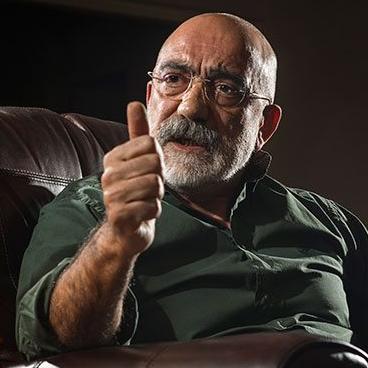
Journalist Ahmet Altan is charged with inserting subliminal messages in support of the failed 15 July coup in Turkey.
Nine months. That’s how long brothers Ahmet and Mehmet Altan have been in pre-trail detention in Turkey. Prosecutors are demanding multiple life sentences for the brothers, who will face their first day in court on 19 June.
“The case against Ahmet and Mehmet Altan is deeply troubling. The ongoing judicial harassment of the Altans and other journalists puts ‘democratic’ Turkey in the same camp as some of the world’s most egregious dictatorships. The post-coup crackdown on freedom of expression and the press must be rolled back,” Melody Patry, head of advocacy, Index on Censorship said.
Ahmet Altan has written for several of the country’s most influential newspapers. He and his brother Mehmet, an academic, were arrested and are being held on suspicion of “spreading subliminal messages”, relating to an appearance Ahmet Altan made on a television talk show the night before the 15 July coup attempt.
Ahmet Altan is one of Turkey’s top journalists, having worked in every position from reporter to editor-in-chief at several newspapers, as well as a producer of television news. He was a columnist for daily newspapers including Hurriyet and Milliyet, and in 2007 he started Taraf, an opposition daily. In 2008 he was charged with “denigrating Turkishness” after he wrote an article dedicated to the victims of the Armenian genocide. He is also considered one of Turkey’s finest novelists, with his most recent book, Endgame, having been published last year.
Mehmet Altan is a professor at Istanbul university, where he has worked for 30 years. A vocal supporter of democracy, he has often called for Turkey to establish its republic on human rights, rather than religious or ethnic identity. He has written several books about politics in Turkey.
The pair were arrested in an early morning raid on 10 September. Ahmet had appeared on a talk show on the Can Erzincan television channel on 14 July, where he is accused of sending messages to viewers to support a coup. The channel has since been shut down. It was perceived by authorities to have been supportive of the cleric Fethullah Gulen, who the government blames for the coup.[/vc_column_text][vc_column_text]
TAKE ACTION
Send a letter of support to Ahmet and Mehmet Altan.
Show your solidarity with the Altans by letting them know the world is watching their case.
Tweet Turkey’s president:
[socialpug_tweet tweet=”.@RT_Erdogan Turkey must end crackdown on #mediafreedom #FreeTurkeyMedia #journalismisnotacrime #AhmetAltan #MehmetAltan” style=”2″ remove_url=”yes” remove_username=”yes”][/vc_column_text][vc_column_text]

Turkey Uncensored is an Index on Censorship project to publish a series of articles from censored Turkish writers, artists and translators.
[/vc_column_text][/vc_column][/vc_row][vc_row][vc_column][vc_basic_grid post_type=”post” max_items=”12″ style=”load-more” items_per_page=”4″ element_width=”6″ grid_id=”vc_gid:1494246747427-afb47fc0-82c9-2″ taxonomies=”55″][/vc_column][/vc_row]
4 May 2017 | News and features, Turkey
[vc_row][vc_column][vc_column_text]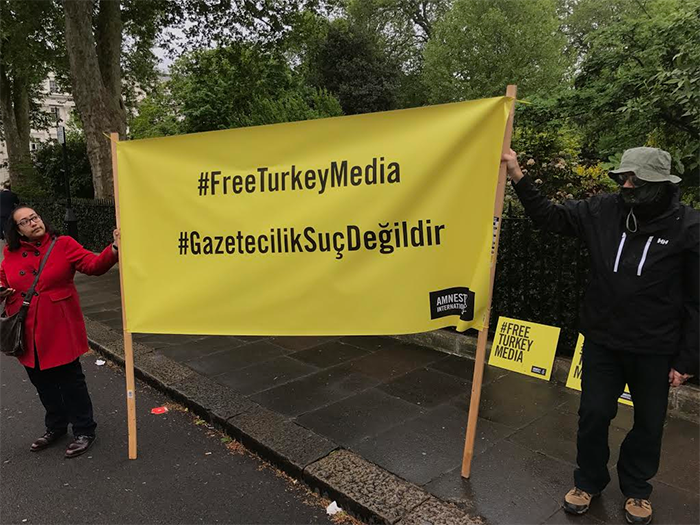
On 3 May, World Press Freedom Day, dozens of activists and journalists gathered outside the Turkish Embassy in London to protest the arrest and imprisonment of journalists in Turkey. Index on Censorship joined Amnesty International, English Pen, Article 19 and others bearing signs and messages of hope.
Following the failed military coup in July of 2016, the Turkish government has unleashed a massive crackdown on its opposition, specifically targeting journalists, media outlets and educators.
Since then, over 150 journalists have been detained and over 170 media outlets have been shut down, resulting in an additional 2,500 journalists being out of work. Turkey is now the number one jailer of journalists in the world.
Seamus Dooley, the acting general secretary of the Nation Union of Journalists, addressed the protest, which took place across the street from the embassy: “We may be on the wrong side of the road but we are on the right side of history.”
Dooley highlighted the importance of coming out to protest in support of Turkey’s journalists, regardless of the weather: “Solidarity is the most important thing we can give them. Although this may seem like a dark time, the fact we are still with them shines a light on it.”
Many protesters stressed the importance of continuing to campaign until those being silenced in Turkey are free.
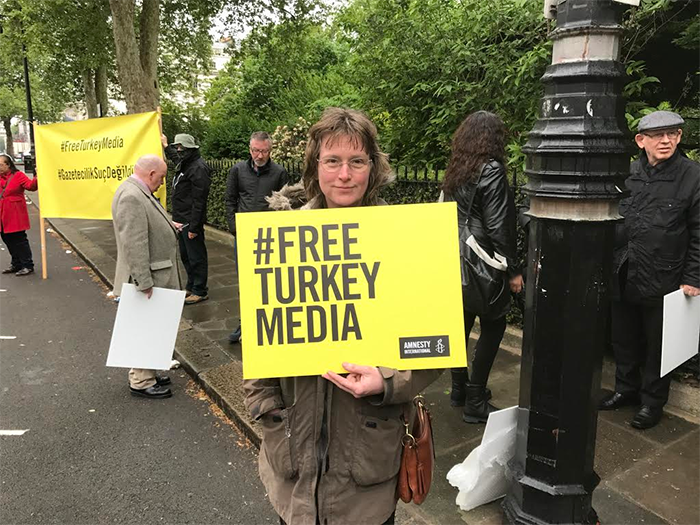
Ulrike Schmidt, Amnesty International
Ulrike Schmidt of Amnesty International said: “As a human rights organisation it’s our job to speak out. It’s World Press Freedom Day so we’re standing here to support the journalists in Turkey. We will keep campaigning until they can do their work again.”
Others spoke out specifically about friends who had been detained as a result of the crackdown. Two of the protesters (pictured below) came specifically to highlight the case of Ahmet Sik, a journalist with the Turkish opposition newspaper Cumhuriyet, who is currently being tried on accusations of spreading terrorist propaganda as well as insulting the state.
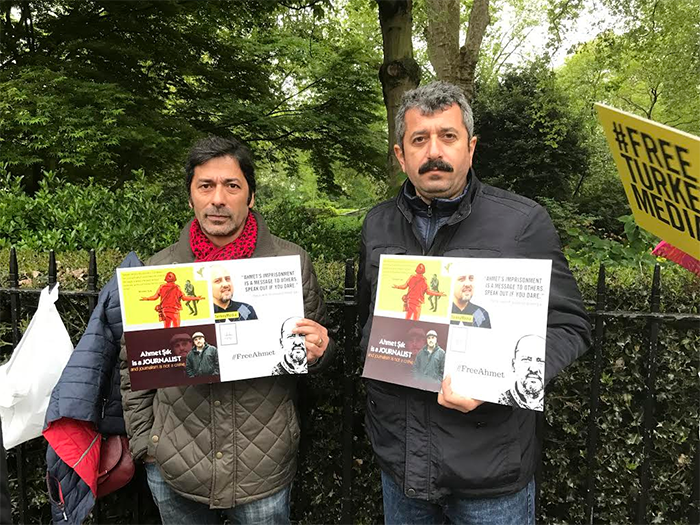
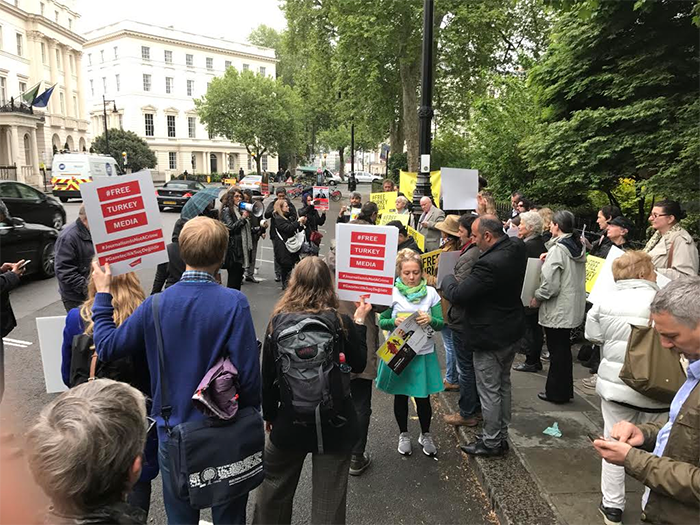 [/vc_column_text][vc_column_text]
[/vc_column_text][vc_column_text]

Turkey Uncensored is an Index on Censorship project to publish a series of articles from censored Turkish writers, artists and translators.
[/vc_column_text][/vc_column][/vc_row][vc_row][vc_column][vc_basic_grid post_type=”post” max_items=”4″ element_width=”6″ grid_id=”vc_gid:1493899892143-33f1af52-13d4-5″ taxonomies=”8607″][/vc_column][/vc_row]








 [/vc_column_text][vc_column_text]
[/vc_column_text][vc_column_text]